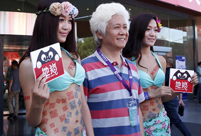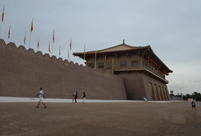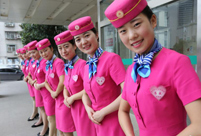 In pics: YOG prism
In pics: YOG prism
 Amputee girl reaches top of half-left tower in Jiangxi
Amputee girl reaches top of half-left tower in Jiangxi
 Yardangs in Lop Nur
Yardangs in Lop Nur
 Intoxicating Ayding Lake in Xinjiang
Intoxicating Ayding Lake in Xinjiang
 Beijing's MJ impersonator a 'thriller' for crowds
Beijing's MJ impersonator a 'thriller' for crowds
 Armed police compete on the plateau
Armed police compete on the plateau
 Rubber Duck settles in Guiyang new urban area
Rubber Duck settles in Guiyang new urban area
 Rare set of giant panda triplets turn one month old
Rare set of giant panda triplets turn one month old
 Closing ceremony of Youth Olympic Games
Closing ceremony of Youth Olympic Games
 Attractive posters to welcome freshmen
Attractive posters to welcome freshmen
2. On the provisions on the core issues of universal suffrage for the Chief Executive
Article 45 of the Hong Kong Basic Law has already set out quite clear provisions on universal suffrage for selecting the Chief Executive. In accordance with the Hong Kong Basic Law, the views of the members of the NPC Standing Committee and those from others, Article II of the Draft Decision has made the following provisions on the core issues of universal suffrage for the Chief Executive:
(1) On the composition of the nominating committee
Paragraph (1) of Article II of the Draft Decision provides that: "The provisions for the number of members, composition and formation method of the nominating committee shall be made in accordance with the number of members, composition and formation method of the Election Committee for the Fourth Chief Executive." According to this provision, the nominating committee to be defined by amendments to Annex I to the Hong Kong Basic Law shall follow the current composition of the Election Committee, which consists of 1,200 members from four major sectors in equal proportions, and keep the existing method for selecting the members as provided for by Annex I to the Hong Kong Basic Law. The major considerations with regard to this provision are:
First, considering the legislative intent of the Hong Kong Basic Law, the expression "broadly representative" in the context of "a broadly representative nominating committee", as provided in Paragraph 2 of Article 45 of the Hong Kong Basic Law, carries the same meaning as that in "a broadly representative Election Committee", as provided in Annex I to the Hong Kong Basic Law. That is, the committee shall be composed of members from four sectors in equal proportions, the delimitation of the various sectors, the organizations in each sector eligible to return members and the number of such members to be returned by each of these organizations shall be prescribed by the electoral law enacted by the Hong Kong Special Administrative Region, and the committee members shall be elected by corporate bodies in various sectors on their own in accordance with the number of seats allocated and the election method as prescribed by law. The provision in the relevant Decision of the NPC Standing Committee on 29 December 2007 that "the nominating committee may be formed with reference to the current provisions regarding the Election Committee in Annex I to the Hong Kong Basic Law", indicates clearly the common theme between the nominating committee and the Election Committee as regards formation. Since there remains different understanding in the Hong Kong community on this issue, it is necessary to make further clarifications with a view to properly implementing the provisions of the Hong Kong Basic Law.
Second, the method for forming the Election Committee to elect the Chief Executive was based on the consensus forged during the extensive consultations and discussions when drafting the Hong Kong Basic Law. Past elections for the Chief Executive since the return of Hong Kong have proven that the Election Committee has covered representative figures from all sectors of the Hong Kong community and achieved balanced participation of all sectors, and is therefore in conformity with the actual situation of Hong Kong. Composing the nominating committee in line with the formation of the current Election Committee meets the requirements of both the relevant provisions of the Hong Kong Basic Law and the objective need to ensure balanced participation and fend off various risks during election of the Chief Executive by universal suffrage.
Third, there are relatively more views in the Hong Kong community that the composition of the nominating committee should be decided with reference to the existing method for forming the Election Committee. There are considerable views that the number of members, composition and formation method of the nominating committee should be determined by following the existing provisions of the Election Committee. Bearing in mind that the provisions regarding the Election Committee for the fourth Chief Executive were made in 2010 alongside amendments to the method for selecting the Chief Executive and approved by the NPC Standing Committee, and that the total number of seats of the Election Committee was increased from 800 to 1,200, with such increase being made in equal proportions for all four sectors, and with the endorsement and support from all sides, it is relatively appropriate to provide for the nominating committee to have the same number of members, composition and formation method as the Election Committee.
(2) On the number of Chief Executive candidates
Paragraph (2) of Article II of the Draft Decision stipulates that "The nominating committee shall nominate two to three candidates for the office of Chief Executive in accordance with democratic procedures". The major considerations with regard to this provision are:
First, the stipulation to have two to three candidates for the office of the Chief Executive is made to ensure a truly competitive election and present voters with real choices. It could also serve to avoid problems such as complicated electoral procedures and high election costs caused by having too many candidates.
Second, since the return of Hong Kong, almost all elections for the Chief Executive were conducted each with a candidacy of two to three. It fits relatively well with the experience gained from previous elections in Hong Kong to set the number of candidates at two to three.
(3) On the need of a Chief Executive candidate to have the endorsement of more than half of the members of the nominating committee
Paragraph (2) of Article II of the Draft Decision stipulates that "Each candidate must have the endorsement of more than half of all the members of the nominating committee". The major considerations with regard to this provision are:
First, the nominating committee as provided for by the Hong Kong Basic Law is a specialized institution for nomination. It collectively exercises the power to nominate Chief Executive candidates as an institution, and must therefore reflect the collective will of the institution. The "democratic procedures" stipulated in Paragraph 2 of Article 45 of the Hong Kong Basic Law should follow the democratic principle of majority rule so as to reflect the requirement that the nominating committee exercises power in a collective manner. Hence, it is appropriate to stipulate that a person contending for nomination as the Chief Executive candidate must obtain the support of more than half of the members of the nominating committee.
Second, the nominating committee will comprise members from the four sectors in equal proportions. The stipulation that contenders for nomination as the Chief Executive candidates must obtain the support of more than half of the members of the nominating committee means that candidates need to obtain a certain extent of support from each sector of the nominating committee. This will help fulfill the principle of balanced participation and meet the interests of various sectors of the Hong Kong community.
Third, the Report by the Chief Executive indicates considerable views of the Hong Kong community that a person contending for nomination as the Chief Executive candidate has to obtain support from a certain proportion of members of the nominating committee. Among the views heard by the General Office of the NPC Standing Committee, quite a number of people called for the proportion to be specified. Therefore, the further clarification that a person contending for nomination as the Chief Executive candidate must obtain the endorsement of more than half of the members of the nominating committee, is consistent with the provisions of the Hong Kong Basic Law, and will facilitate consensus building in the Hong Kong community.
(4) On the method for voting in the election for the Chief Executive
Article 26 of the Hong Kong Basic Law stipulates that "Permanent residents of the Hong Kong Special Administrative Region shall have the right to vote and the right to stand for election in accordance with law". On that basis, Paragraph (3) of Article II of the Draft Decision stipulates that "All eligible electors of the Hong Kong Special Administrative Region have the right to vote in the election of the Chief Executive and elect one of the candidates for the office of Chief Executive in accordance with law". According to this provision, each and every eligible elector shall have the right to directly participate in electing the Chief Executive. It fulfills the principle of universal and equal electoral right and marks a historic step forward in Hong Kong's democratic development.
(5) On appointment of the Chief Executive
Paragraph 1 of Article 45 of the Hong Kong Basic Law provides that "The Chief Executive of the Hong Kong Special Administrative Region shall be selected by election or through consultations held locally and be appointed by the Central People's Government." Based on this provision, Paragraph (4) of Article II of the Draft Decision stipulates that "The Chief Executive-elect, after being selected through universal suffrage, will have to be appointed by the Central People's Government". The central authorities, in formulating the basic policies with respect to Hong Kong and the Hong Kong Basic Law, already clearly pointed out that the power of the Central People's Government to appoint the Chief Executive of the Hong Kong Special Administrative Region is a substantive one. The Central People's Government has the right to make the final decision on whether to appoint or not to appoint the Chief Executive returned by election held locally in Hong Kong.
 |  |
 Models with two-dimensional codes painted on bodies
Models with two-dimensional codes painted on bodies Antique exhibition of Maritime Silk Road held in Jinan
Antique exhibition of Maritime Silk Road held in Jinan NASA releases images of solar flare
NASA releases images of solar flare Daming Palace in Chang’an City in photos
Daming Palace in Chang’an City in photos Babies of celebrities born in the year of horse
Babies of celebrities born in the year of horse Farmer Painting, one of Ansai's Three Strange Wonders
Farmer Painting, one of Ansai's Three Strange Wonders Special holidays
Special holidays World's top 10 fighters
World's top 10 fighters 'Stewardesses' serve in hospital
'Stewardesses' serve in hospital The biggest duty-free store of the world
The biggest duty-free store of the world Volunteers bid farewell to YOG
Volunteers bid farewell to YOG More police dogs join anti-terror campaign in Inner Mongolia
More police dogs join anti-terror campaign in Inner Mongolia Picturesque Dayilan Manchu village in NE China
Picturesque Dayilan Manchu village in NE China Athletes experience the charm of Chinese traditional opera in Nanjing
Athletes experience the charm of Chinese traditional opera in Nanjing Contestants for Miss Bikini World experience Chinese traditional culture
Contestants for Miss Bikini World experience Chinese traditional cultureDay|Week|Month